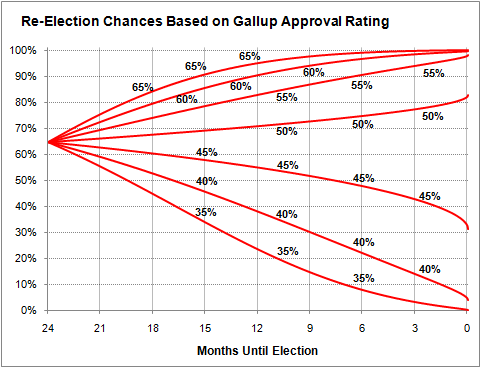Curated and elaborated from my Twitter stream, here are some raw, incomplete, somewhat disjointed thoughts on last night’s State of the Union address:
After that underwhelming speech, I have little hope for 2011 and, of course, none for 2012. Obama failed to inspire or lead. And so the nation creeps ever closer to its day of fiscal reckoning, with no one apparently willing to make us make the hard choices. #PANIC
I don’t mean “no hope for 2012” in reference to Obama’s re-election bid, by the way. I mean agenda-wise. Nothing will get done in 2012, because it’s a presidential election year, so the only hope to credibly tackle the long-term deficit during Obama’s first term is/was to address it head-on now and make it a priority in 2011. Obama touched on it last night, but made no concrete proposals and declined to endorse any of his commission’s politically difficult options. Instead he did what politicians always do, proposing short-term deficit measures that are either nonspecific (across-the-board spending freeze!), relatively painless (no more pork! eliminate waste!), or both. Above all, they’re measures that will do precious little to actually solve the problem they’re being offered as solutions to.
Yes, Obama acknowledged that his proposals only address a small percentage of the budget. That, at least, makes him a bit more honest than much of the GOP, which seems endlessly willing to use the public’s inability to process the difference between millions, billions and trillions to its advantage. (OMG, we’re wasting tens of millions of dollars on Fannie Mae legal bills! We should stop doing that! Look at me, I’m a deficit hawk!) But despite acknowledging that long-term structural deficits are the core of the problem, Obama didn’t propose anything to address them. He only paid them lip-service, neither offering nor endorsing any potential solutions (not even kinda sorta quasi-specific ones!). And he took several options off the table. Thus, in terms of actual proposals, Obama’s deficit cutting agenda is Republican Lite. Totally unserious, focused on the small-bore and short-term instead of the big-picture and long-term. By endorsing an earmark ban, a spending freeze, etc., he vindicates GOP bulls**t instead of pivoting to the real problem (long-term structural deficits).
He needed to call GOP’s bluff, to call out its ridiculous focus on short-term deficits and small-bore measures. Instead he joined ’em. He needed to say, OK, so you’re deficit hawks and Tea Partiers? Great, let’s make X, Y & Z painful choices to fix the long-term budget. Challenge them to come along with him, or face presidential scorn and mockery for their hypocrisy if they don’t. If necessary, go over Congress’s heads, like Reagan did, and use his soaring rhetoric and communication skills to sell the public on the necessity of making these hard choices now (a tall order, I know, but if he’s not going to try it, who will?). Instead he said, meh, we gotta do something, I haz a commission, they said some stuff, let’s think about it some more. Tom Coburn is right: he voted present.
Obama has said he’d rather be a one-term president who gets things done than a two-termer who doesn’t. After last night, I say: “YOU LIE!” What we needed was rare, courageous leadership from him. What we got was politics as usual. Where we’re going is Hell in a handbasket. After last night’s speech, I’m more convinced than ever that we’re going to #LoseTheFuture.
Obama was supposed to be different. If I may channel Obi-wan for a moment: “You were supposed to be the Chosen One!!!” 😉 Instead, he’s just a typical politician, doing the easy/obvious thing and trying to position himself to get re-elected. #FAIL
(Or, as Becky put it, “The Budget Deficit: brought to you by bloated entitlements that neither party has the political courage to address. #DemFAIL #GOPFAIL.”)
See also, everything Ross Douthat said:
If you were a visitor from Mars, watching tonight’s State of the Union address and Paul Ryan’s Republican response, you would have no reason to think that the looming insolvency of our entitlement system lies at the heart of the economic challenges facing the United States over the next two decades. From President Obama, we heard a reasonably eloquent case for center-left technocracy and industrial policy, punctuated by a few bipartisan flourishes, in which the entitlement issue felt like an afterthought: He took note of the problem, thanked his own fiscal commission for their work without endorsing any of their recommendations, made general, detail-free pledges to keep Medicare and Social Security solvent (but “without slashing benefits for future generations”), and then moved swiftly on to the case for tax reform. Tax reform is important, of course, and so are education and technological innovation and infrastructure and all the other issues that the president touched on in this speech. But it was still striking that in an address organized around the theme of American competitiveness, which ran to almost 7,000 words and lasted for an hour, the president spent almost as much time talking about solar power as he did about the roots of the nation’s fiscal crisis.
Ryan’s rejoinder was more urgent and more focused: America’s crippling debt was an organizing theme, and there were warnings of “painful austerity measures” and a looming “day of reckoning.” But his remarks, while rhetorically effective, were even more vague about the details of that reckoning than the president’s address. Ryan owes his prominence, in part, to his willingness to propose a very specific blueprint for addressing the entitlement system’s fiscal woes. But in his first big moment on the national stage, the words “Medicare” and “Social Security” did not pass the Wisconsin congressman’s lips.
None of this was particularly surprising. It’s clear that both parties have decided that a period of divided government twelve months before a presidential election is the wrong time to make big moves on entitlements and the deficit. Better to wait, jockey for position, and hope that the correlation of forces after 2012 will be more favorable to their preferred solutions. And it’s clear, too, that they’ve decided (with honorable exceptions) that it’s too risky to even begin building support for the unpopular cuts or tax increases ahead. The bet, on both sides, is that there’s still time to work with, and that the other party will blink, or at least give ground, before the real crunch arrives.
Let’s hope they’re right.
I have little hope of that. There’s always another election less than two years away. I thought 2011 might be the year Obama would seize the moment and show his true leadership. Will 2013 instead be that year? Maybe, but ugh, I’m done giving free passes to this guy based on the potential that he might show real seriousness at some point. If he’s still our last best hope, and he may be, it’s only because the alternatives are so poor. (But cf., Mitch Daniels ’12?) For the first time, though, I fairly strongly suspect that Obama is not the right man for this moment. Would McCain have been better? Certainly not. Hillary? I dunno. But Obama is looking more and more like an near-perfect example of squandered potential. And America really can’t afford that right now.
P.S. Clive Crook: “[T]his was not the speech of a president focused, as Mr. Obama should be, on the country’s fiscal condition. He expressed concern about it, but no great sense of urgency. The thrust of the speech, in fact, pushed the other way. … Did he start to prepare the country for the coming fiscal restraint? The ‘Sputnik moment’ says no. Did he give even an outline of the path back to fiscal control? No.”
P.P.S. Reason‘s Matt Welch:
[A]s Rep. Paul Ryan rightly emphasized last night, the only real policy issue in America right now is that we are on the verge of fiscal catastrophe because cannot afford the government we’re paying for today, let alone the one we’re promising for tomorrow. And the president, though he is much more serious on this issue than a huge swath of his political party, is nonetheless not remotely serious about this issue. Vowing to cut $400 billion over 10 years (a plan that, judging by the two people clapping when he proposed it, will likely be cut to ribbons if it survives through Congress), at a moment when the deficit for this year is more than three times that, indicates that Democrats (and a helluva lot of Republicans as well) are hunkering down in our awful status quo–half-heartedly tinkering around the edges of spending, making incremental changes this way and that, then launching new moonshots and redoubling old impotent efforts. Politicians have put us on the precipice of financial ruin, and they show no indication of doing a damned thing about it.
And I think they know it. Look at the plaintive, semi-desperate, Stuart Smalleyesque mantra Obama kept repeating at the end: “We do big things.” By his insistence his anxiety shall be revealed. We don’t do big things, America, not in the moonshotty Marshall Plan way of speechwriters’ cliche box. Increasingly, we don’t do little things, either — like keeping libraries open five days a week in California. What we do is snarf up ever-larger portions of your grandkids’ money for purposes that are usually obscure and often criminal. …
No, these people are not serious about the task at hand. The state of our union, as measured by the competence of people in power, is a f***ing disgrace.
P.P.P.S. More good analysis from Doug Mataconis.


